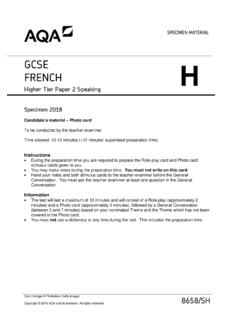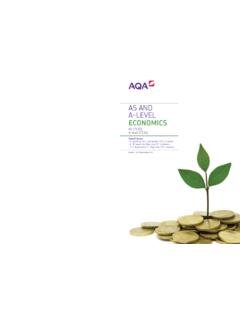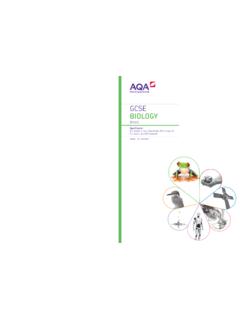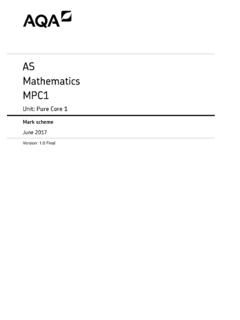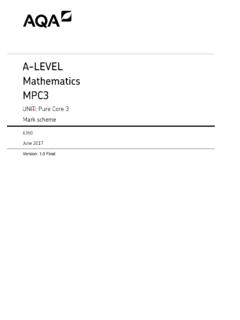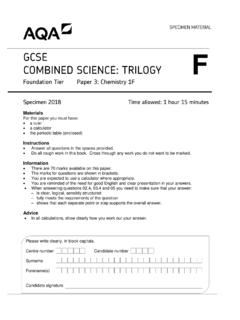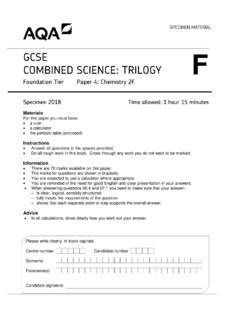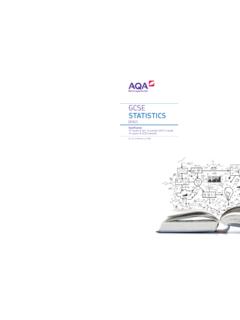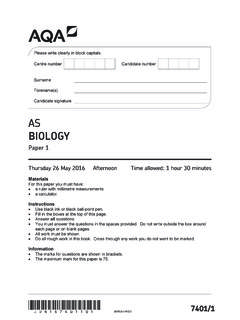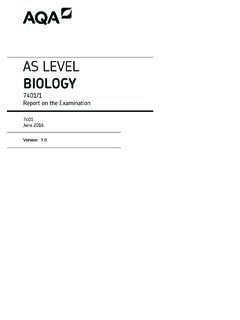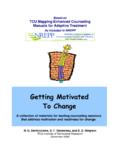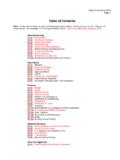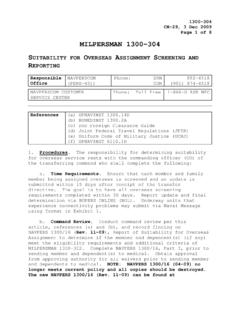Transcription of GCSE Sociology Question paper Unit 01 - Studying …
1 *JUN164190101* IB/G/Jun16/E6 41901 GCSE Sociology Unit 1 Studying Society; Education; Families Monday 16 May 2016 Afternoon Time allowed: 1 hour 30 minutes Materials You will need no other materials. Instructions Use black ink or black ball-point pen. Fill in the boxes at the top of this page. This paper is divided into three topics . Topic 1: answer all questions. Topic 2: answer all questions in Section 1 and one Question from Section 2. Topic 3: answer all questions in Section 3 and one Question from Section 4. You must answer the questions in the spaces provided. Do not write outside the box around each page or on blank pages. Do all rough work in this book. Cross through any work you do not want to be marked. Information The marks for questions are shown in brackets. The maximum mark for this paper is 90. Questions carrying 12 marks should be answered in continuous prose.
2 In these questions you will be marked on your ability to: use good English organise information clearly use specialist vocabulary where appropriate. Advice You are advised to spend about 30 minutes answering each of the three topics . Please write clearly in block capitals. Centre number Candidate number Surname Forename(s) Candidate signature 2 *02* IB/G/Jun16/41901 Do not write outside the box Topic 1 Studying Society Study Items A and B (below), and Item C (page 3). Answer all questions that follow in the spaces provided. Item A Everyday sexism Percentage of girls and young women who had experienced sexism in these areas of their lives: Aged 11 16 Aged 17 21 At home 17% 25% At school/college 65% 63% In public places 59% 67% Online/social media 59% 72% Item B Researching changes in girls attitudes In 2014, 1405 girls and young women between the ages of 7 and 21 took part in an attitudes survey conducted by the research organisation Childwise.
3 A similar study had been carried out in 1994 by sociologist Sue Sharpe, who used unstructured interviews in order to find out about girls attitudes to education. 1 From Item A, in which area of life had girls aged 11 16 experienced most sexism? (Tick the correct box.) [1 mark] Online/social media At school/college In public places 1 3 *03* Turn over IB/G/Jun16/41901 Do not write outside the box 2 From Item B, identify the research method used by Sue Sharpe. [1 mark] 3 Give one advantage and one disadvantage of using Sue Sharpe s research method as referred to in Item B. [2 marks] Advantage Disadvantage Item C Exploring the changing attitudes of young people The Citizenship Education Study is a longitudinal survey of attitudes among young people in England. The study follows how young people s attitudes change as they progress through adolescence and into adulthood.
4 The first survey was undertaken in 2003, when the participants were aged 12 and in their first year of compulsory secondary education. Four further surveys have since been conducted, providing a snapshot of the participants attitudes at the ages of 14, 16, 18 and 20. 4 Study Item C. Describe how a longitudinal study might be useful for researching the changing attitudes of young people. [4 marks] 1 2 4 *04* IB/G/Jun16/41901 Do not write outside the box Extra space 5 Explain what sociologists mean by gender discrimination. [4 marks] Extra space 4 4 5 *05* Turn over IB/G/Jun16/41901 Do not write outside the box 6 Explain why sociologists may use qualitative data rather than quantitative data when researching the attitudes of young people. [4 marks] Extra space You have been asked as a sociologist to investigate the extent of sexism in British schools.
5 7 Identify one primary research method you could use and explain why you would use this primary research method for your investigation. [4 marks] 4 6 *06* IB/G/Jun16/41901 Do not write outside the box Extra space 8 Identify one ethical issue that you may need to consider and explain why you need to consider this ethical issue for your investigation. [4 marks] Extra space 4 7 *07* Turn over IB/G/Jun16/41901 Do not write outside the box 9 Identify one sampling method that you might use and explain why it is better than another possible sampling method for your investigation. [6 marks] Extra space 6 4 8 *08* IB/G/Jun16/41901 Do not write outside the box Topic 2 Education Study Items D and E (below). Answer all questions in Section 1 and one Question from Section 2 in the spaces provided.
6 Item D British values survey In 2014, 2030 people were asked if British values should be taught in schools. Age Percentage (%) who said: 18 24 25 34 35 44 45 54 55 64 65+ Yes 76 80 86 90 92 94 No 24 20 14 10 8 6 Item E Underachievement in Education In 2014, a House of Commons committee found evidence of wide gaps in achievement between poor pupils from White families and those from other ethnic groups. Just 32 per cent of poor, White British children pass at least five GCSEs at Grade C and above, including English and mathematics, compared with 42 per cent of poor Black Caribbean children, and 61 per cent of poor Indian children. The committee called for the government to consider incentives to attract high quality teachers to work in areas with poor, White, working-class pupils. Section 1 10 From Item D, identify the trend in the percentage of people surveyed who thought that British values should be taught in schools.
7 (Tick the correct box.) [1 mark] Decreasing with age Increasing with age Stable 1 9 *09* Turn over IB/G/Jun16/41901 Do not write outside the box 11 From Item E, which social group achieved the lowest percentage of at least five GCSE passes at Grade C and above, including English and mathematics? [1 mark] 12 Identify two types of secondary school found in England which do not have to follow the national curriculum. [2 marks] Type 1 Type 2 13 Explain what sociologists Studying education mean by secondary socialisation. [4 marks] Extra space 1 2 4 10 *10* IB/G/Jun16/41901 Do not write outside the box 14 Describe one education policy of the past 20 years that has attempted to assist pupils from disadvantaged backgrounds and explain how successful this policy has been. [5 marks] Extra space 5 11 *11* Turn over IB/G/Jun16/41901 Do not write outside the box 15 Describe one way in which schools may encourage social mobility and explain how effective this is.
8 [5 marks] Extra space Turn over for the next section 5 12 *12* IB/G/Jun16/41901 Do not write outside the box Section 2 Answer either Question 16 or Question 17. You may find it helpful to refer to the Items on page 8. 16 Discuss how far sociologists would agree that the main function of the education system is to encourage British values and social cohesion. [12 marks] 17 Discuss how far sociologists would agree that school-based factors are the main cause of differences in the educational achievement of different social groups. [12 marks] Write your answer to the Question you have chosen on pages 12, 13 and, if needed, page 14. Write the number of the Question you have chosen in the box below, eg 1 6 . 13 *13* Turn over IB/G/Jun16/41901 Do not write outside the box 14 *14* IB/G/Jun16/41901 Do not write outside the box Extra space 12 15 *15* Turn over IB/G/Jun16/41901 Do not write outside the box Turn over for the next topic DO NOT WRITE ON THIS PAGE ANSWER IN THE SPACES PROVIDED 16 *16* IB/G/Jun16/41901 Do not write outside the box Topic 3 Families Study Items F and G (below).
9 Answer all questions in Section 3 and one Question from Section 4 in the spaces provided. Item G The importance of the nuclear family in society There are a number of different sociological approaches to the study of families. Functionalist sociologists believe that the nuclear family is a key institution in society. This is because the nuclear family performs a number of essential functions for individuals and for society as a whole, for example primary socialisation. However, Marxist and feminist sociologists may have a more negative view of the nuclear family. 17 *17* Turn over IB/G/Jun16/41901 Do not write outside the box Section 3 18 From Item F, what is the trend between 1994 and 2012 in the laundry always/usually being done by the woman? (Tick the correct box.) [1 mark] Decreasing Increasing Stayed the same 19 From Item G, which sociological approach believes that the nuclear family is a necessary and important part of society?
10 [1 mark] 20 Identify two ways in which grandparents may assist other family members. [2 marks] Way 1 Way 2 21 Explain what sociologists mean by joint conjugal roles. [4 marks] 1 1 2 18 *18* IB/G/Jun16/41901 Do not write outside the box Extra space 22 Describe one family type that has increased in Britain over the past 30 years and explain why this family type is now more commonly found. [5 marks] Extra space 4 19 *19* Turn over IB/G/Jun16/41901 Do not write outside the box 23 Describe the feminist approach to the traditional nuclear family and explain how this differs from another sociological approach to the traditional nuclear family. [5 marks] Extra space 5 5 20 *20* IB/G/Jun16/41901 Do not write outside the box Section 4 Answer either Question 24 or Question 25.
